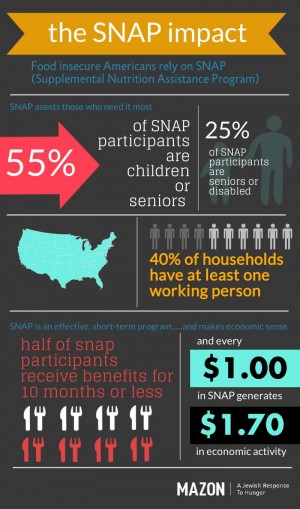Radicalize Thanksgivikkuh: Fight for Freedom (from Hunger)
This week, it’s a miraculous merging of two unrelated holidays into one epic celebration, a once-in-a-lifetime opportunity to invent words: Thanksgivukkah, menurkey, and more.
I can only imagine how American Jews will honor the day: faithfully lighting the second night’s candles and serving sweet potato latkes alongside their turkeys. Delicious. But I couldn’t call myself a lifelong activist if I didn’t take this opportunity to sound the call to action.
There’s certainly nothing wrong with enjoying delicious food with friends and family – that’s the best part about holidays. For those of us who can. But on behalf of the millions who can’t, I propose we embrace a far more radical interpretation of this momentous occasion.
Chanukah and Thanksgiving both celebrate the importance of freedom – freedom from oppression, from religious persecution and from want. As we gather to celebrate our hard won freedoms, we must also raise our voices. And keep raising them until everyone in America can enjoy the most basic freedom: freedom from want.
Today, nearly 50 million Americans, including 17 million children, cannot consistently rely on having enough food to lead an active, healthy life. That’s more struggling Americans than the entire population of Canada. And as of November 1, things have been getting worse for millions, especially for those who’ve fed their families with the help of the Supplemental Nutrition Assistance Food Program (SNAP), formerly known as food stamps.
From 2008 to 2012, the recession and weak recovery led more people than ever before to apply for food assistance. [For example, in Colorado], the number of individuals receiving SNAP benefits doubled to 511,000 people, or 10 percent of the population. Nationally, the number of people on SNAP grew from 28 to 48 million people, or 15 percent of all Americans. That rapid rate of growth has slowed a bit this year as the economy improved…. As part of [their attempt to reauthorize a five-year] farm bill, House members voted to cut $40 billion from the program over the next 10 years. The Senate voted to cut $4 billion. So the bill is now stalled.
Back to Basics
Food is the most basic human need. Hungry children can’t learn, and hungry adults can’t work. They can’t create. They can’t heal. They can’t address any other priority because alleviating their hunger becomes the only priority.
Who are these people? Hungry people can be found in every city, county and state across the country – no community is spared. They are men and women who have lost their jobs due to the economic downturn or they’ve been financially wiped out by a medical emergency or other crisis. They are veterans. They are families with at least one working parent who are still unable to make ends meet. These are real people – our neighbors, our friends, our family members. They need real help.
So how are policymakers responding? Are they innovating new programs to meet the growing need? Nope. Are they strengthening vital safety-net programs these families rely on? Nope. Well, at least have they left it intact, right? Nope. Worse yet, they’re trying to dissolve the last remaining threads of the safety net.
It’s no secret: they’ve got their sights trained on SNAP. Rather than working to advance smart policies that will hasten our nation’s recovery, they propose to take food out of the mouths of hungry people.
Our faith, like other faith traditions, teaches that the community has an obligation to sustain its most vulnerable. SNAP is the epitome of this fundamental idea, successfully realized on a larger scale. SNAP represents our collective commitment, as a national community: When times are tough, we stand together to help families get back on their feet.
Leaders from both chambers of Congress are now in conference, attempting to negotiate a mutually agreeable Farm Bill – that’s where SNAP lives. But they must remember that their task is not a math problem. Or a political science exercise designed to test the political acumen of party extremists manipulating the rules to get their way. These negotiations have real consequences for real, vulnerable people. And we’re tired of caricatures drawn from over-played stereotypes.
70 years ago, President Franklin Roosevelt told Congress that Americans had a right to “freedom from want.” He understood that a lack of access to basic nutrition undermines a person’s ability to enjoy other fundamental rights.
Scandalous
It’s a scandal that our policymakers have done so little since then to make good on that promise of “freedom from want.”
No country is better equipped to guarantee its citizens a right to food than the United States. What’s needed now is not the means but the political will to ensure that all Americans have enough to eat.
Unfortunately, the uncertain fate of food stamps on Capitol Hill casts grave doubt on whether our leaders possess that will.
And so it comes to us. We must raise our voices to those appointed to the Farm Bill Conference Committee and to congressional leadership. Tell them that we expect better, that Congress is failing to live up to our collective responsibility to help the most vulnerable, that our country is missing the mark in protecting the right of our citizens to live free from hunger.
Take Action Now
*Call the congressional switchboard at 202-224-3121 and ask to speak to Congressman Frank Lucas (R, OK), House Agriculture Committee Chairman. Tell him or a staffer to protect SNAP.
*Tell your friends and family how much this issue means to you and ask them to visit Zeek and read this article, then take action.
*Share this on Twitter, Facebook, Pinterest, Tumblr, Reddit, and anywhere else you spend time.
Abby J. Leibman is the President & CEO of MAZON: A Jewish Response to Hunger, a national nonprofit organization working to end hunger among people of all faiths and backgrounds in the United States and Israel.
Editor’s Note: Fans of the Hunger Games – don’t miss this video.
![[the current issue of ZEEK]](../../image/2/100/0/5/uploads/leftistethicistgraphic-52842c6a.png)
- 5000 Pages of Zeek
- Founded in 2001, Zeek was the first Jewish online magazine, and we have over 5000 pages online to prove it, all available free of charge. Read more in the Archive.
More articles in



